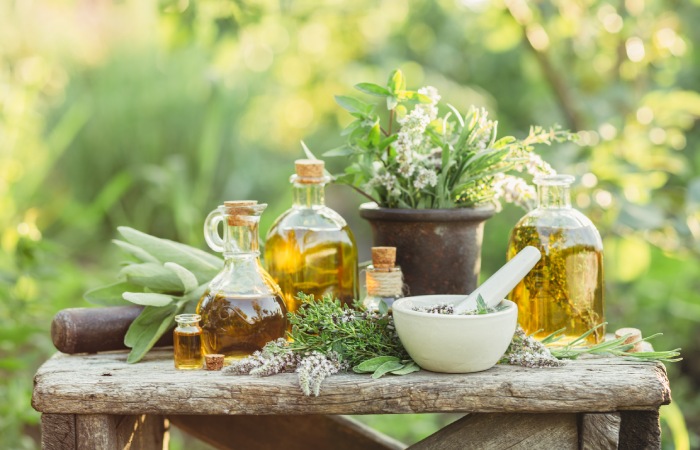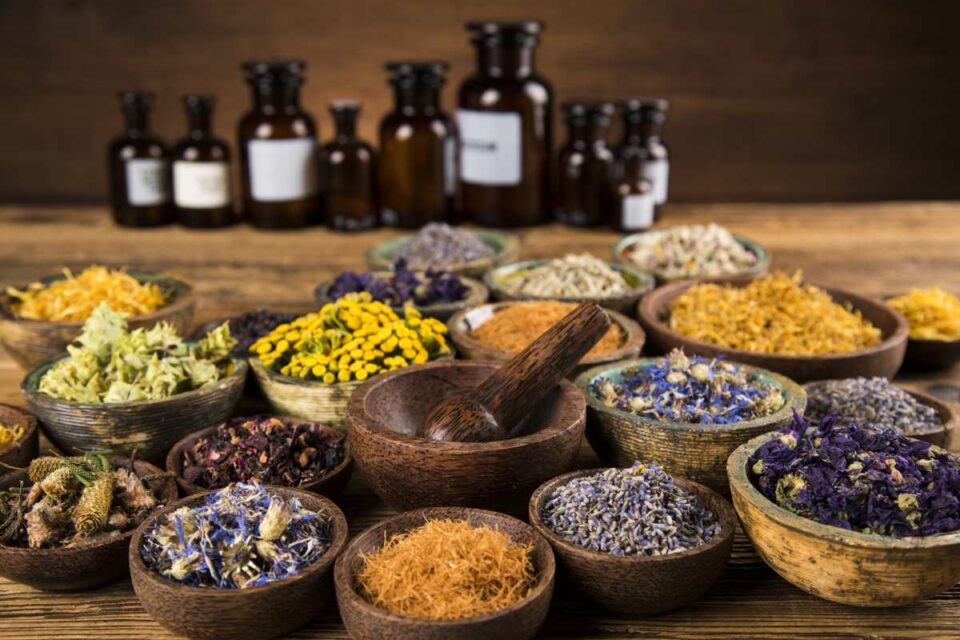For centuries, humans have relied on herbal medicines to heal diseases and protect them from various conditions. Even now, a significant population in many different parts of the world still depend on herbs and plants as their go-to treatments for common diseases.
Nowadays, there’s are even more people who are attracted to therapies that are more natural and less synthetic. It’s the reason why the popularity and usage of herbal medicines in the form of tinctures, essential oils, lotions, serums, teas, and even pills are on the rise.
If you’re interested in reaping the health benefits of herbs and plants, here are some sensible ideas to introduce herbal medicines into your daily routine.
Table of Contents
1. Start A Morning Herbal Routine

Many people wake up in the morning feeling sluggish and tired even when they clocked in more than eight hours of sleep. If you experience it, especially during Monday mornings, you’re not alone. Not everyone is excited and has the energy to bring themselves up and feel happy about going to the office or school.
To change your mood and feel ready for a challenging day ahead, you can use the power derived from herbal medicines. Don’t worry about where to get supplies since it’s easy to shop online buy and learn the correct herbal formulations. Many online shops, like People’s Herbs, sell a wide variety of oils, serums, creams, and incense sticks that you can use for your morning ritual.
So, here are some of the things you can do in the morning to help you start your day right:
- Have a whiff of peppermint while you’re doing your early morning stretching, meditation, or prayers. Peppermint will invigorate your senses and make your mind alert.
- If you feel a bit sluggish, you can add a drop of basil oil to your peppermint (and maybe some lemongrass essence for a wonderful aroma) and put them in your diffuser. Doing so may give your mind some clarity and boost energy.
- Drink lemon or any citrus-infused tea for an added kick.
- During mornings, when you feel you need extra love and self-care, get inspired by an Ayuverdic ritual called Abhyanga, or gentle herbal oil self-massage. Do this right before taking a shower.
2. Include In Your Beauty Regimen
When you hear somebody mention herbal medicines, the first thing you probably think about is some tablet, pill, or supplement. In truth, this traditional type of treatment can come in different forms such as oils, tinctures, creams, or teas. So, when somebody suggests you use herbal medicine in your beauty routine, don’t get the wrong idea that you’ll simply be taking tablets or pills.
There are many ways to use herbs for your beauty regimen that don’t involve popping a pill into your mouth. Here are just a few examples:
- To prevent dandruff, falling hair, or limp hair, use hair masks made from cinnamon, rosemary, and other teas.
- For smoother and clearer skin, have a soothing bath or soak using Chinese herbs and spices.
- For ageless beauty, use revitalizing serums with organic ingredients such as cactus seed, jojoba oil, frankincense, rosehip seed, or ylang-ylang.
- Rub your fingernails and toenails with essential oils to make them easier to clean and trim. You can also use a Chinese herbal toenail tincture due to its antifungal properties.
3. Experiment In The Kitchen
Another way you can incorporate the power of herbal medicine in your daily routine is by adding them to the food you eat. Make your everyday culinary fare healthier and more delicious by adding a dash of rosemary, sage, cinnamon, and turmeric. These spices are known to aid in digestion and fight inflammation.
You can also add medicinal herbs to your salads. Aside from parsley and basil, you can wow your family with alfalfa sprouts, which are rich in vitamins, borage blossoms, and dandelion greens for better skin, or chicory for urinary problems.
4. Carry Herbal Balms Or Salves Daily
If you look inside purses or pockets of some older Asian men and women, you’ll probably find a bottle or canister of aromatic balms or salves. This is because such items are popular in Asia as go-to remedies for minor medical problems and emergencies.
Here are some of their known uses:
- Acts as an analgesic to relieve headache, joint pain, and sore muscles
- Helps ease nasal congestion due to colds
- Soothes itchiness caused by bites from mosquitoes and other insects
- Provides relief from stress and tension
- Alleviates symptoms linked to motion and travel sickness
- Has antibacterial properties that hasten the healing of wounds and acne
- Helps promote sleep and relaxation
5. Use As Supplement To Improve Health
You can include herbal therapy in your daily routine by taking them as supplements. these days, it’s so easy to buy mushroom capsules, turmeric capsules, and a whole host of other herbal capsules that are easy to incorporate into your daily routine and, of course, easy to take. Regardless of your condition, whether you’re suffering from physical, emotional, or even mental discomforts, you can find an herbal medicine supplement that’ll serve as therapy to improve your condition. Regardless of your condition, whether you’re suffering from physical, emotional, or even mental discomforts, you can find an herbal medicine supplement that’ll serve as therapy to improve your condition.
Here are some popular herbal supplements for better health:
- Gingko Biloba is traditionally used to boost memory and mental functions, which is why it’s believed that it may help prevent dementia.
- Elderberry is suggested to ease symptoms of cold and flu. Lozenges with elderberry extract may also ease throat discomforts associated with respiratory infections.
- Echinacea is marketed as an immune-boosting supplement known to prevent cold.
- Turmeric has various health benefits, including analgesic properties to ease pains.
- Valerian root is used as pills or teas to help promote better sleep and relieve stress.
- John’s wort is believed to help people with mild to moderate symptoms of depression.
- Black cohosh with St. John’s wort is known to help with hot flashes linked with menopause.
- Stinging nettle is traditionally used for allergies, but it’s also suitable for fighting dandruff.
6. Use Herbal Medicine To Spice Up Your Sex Life
Many married couples will agree that their sex life reaches a plateau at some point in their relationship, especially when they’re burdened with enormous financial and other responsibilities, such as raising children and maintaining the household.
If you feel that you’re losing libido due to hormonal issues or have so many things to think about other than being intimate with your partner, it may be time to spruce things up with the help of some plants. You can use these herbal medicines as essential oils or as supplements to boost libido.
Other than cuddling, kissing, and foreplay, you may want to add the herbs and spices below to improve your sexual mood.
- Sandalwood essence has been proven to drive sexual excitement in women and make them more in the mood for love.
- Ginseng oil and supplements have been used in many Asian countries to boost brain functions and improve erectile function in men.
- Ginseng is used in Asia to boost sexual drive among menopausal women, and it also helps in men’s erectile function.
- Tribulus Terrestris may intensify sexual pleasure in women and raise libido in men.
- Maca is the main ingredient in many herbal supplements that promote sex drive and help with mild erectile dysfunction in men.
- Fenugreek may improve sex hormone production in both men and women.
7. Blast Away Seasonal Blues With Herbs
The changing seasons bring about different problems for many people. Typically, people who have allergies experience symptoms during the spring season. Meanwhile, the gloomy mood and shortened days can bring anxiety and depression during the winter months.
Here are some herbal medicines you may want to add to your daily regimen for each season:
- Allergic rhinitis is quite common during spring. Combat this problem by taking perilla and stinging nettle to ease colds, eye irritation, runny nose, sinusitis, and other allergy-related symptoms.
- Flu season usually begins in the fall. Boost your immune system by drinking ginger tea with honey and lemon. For better immunity, you can also add astragalus root and angelica root to your elixir.
- Sunburn is a common problem during summer. Aloe vera ointment or gels are helpful in healing blisters and easing pain caused by too much sun exposure. Lotions with rosemary as an ingredient may also help keep your skin hydrated.
- Seasonal Affective Disorder is mood changes brought about by the winter season. Light up candles, incense sticks, or essential oils to brighten up the mood in your home during this season. Essential oils that may boost your energy include basil, grapefruit, and mint. For stress relief, you may try frankincense, ylang-ylang, and jasmine.
8. End Your Day With Night-Time Herbal Ritual
There are some herbal medicines you may add to your night-time ritual to help you relax and wind down after a stressful and busy day. Here are some of them:
- Drink a nightcap of warm chamomile or lavender tea to bring down stress and help relax your body and mind.
- If you’re suffering from itchy skin conditions, soak in a hot bath with oatmeal and a few drops of lavender oil to minimize itch at night.
- If you have trouble sleeping, you may want to try a valerian root supplement.
Bottom Line
Before pharmacies sprouted in every corner of every town, humans depended on herbal medicines to relieve a host of different symptoms and conditions. But just when people think that plant-based remedies are no longer needed because of the many advances in pharmaceutical sciences, herbal medicine’s popularity is making a comeback.
The growing interest in herbal medicines may be driven by people who no longer want to use chemical-based drugs. But whatever the reason for this trend, it’s nice to know that you can add herbal medicines to your daily therapeutic options. Just remember to consult with your doctor before you take any herbal supplements or medication.

